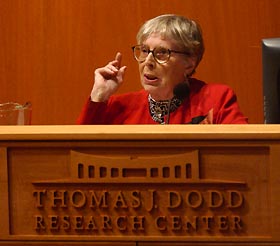|
This is an archived article.
For the latest news, go to the Advance
Homepage
For more archives, go to the Advance Archive/Search Page. |
||
|
Political Changes Affecting
Reading Habits in Latin America By Sherry Fisher Most people in Latin America today don't enjoy difficult prose, preferring instead to read lighter fare, says Jean Franco, a scholar on literature, culture, and politics in Latin America. Her lecture, "Literature and Literacy for a New Era," was given Oct. 7 in the Thomas J. Dodd Research Center's Konover Auditorium. "The success in Latin America of what is known as light literature suggests that the vast majority of the people are not prepared to engage with more complex literary text," Franco said, noting that "literacy is limited to comfortable reading."
Franco, a professor emerita of comparative literature at Columbia University, gave the Robert G. Mead Jr. Lecture, established to honor the memory of Mead, a professor of Latin American literature in the Department of Modern and Classical Languages for 35 years. According to Franco, in Latin America in the 19th and early 20th centuries, teachers were considered sanctified figures. They were often idealized in literature or depicted as the ground troops of modernization. "Education was the ladder to obtain a higher social position," Franco said. "The advancement of individuals through education was thought to be an index of national progress." In the 1960s, literary figures were valued as public intellectuals. They were actively involved in promoting reading "that would neither replicate the stale clichŽ of cultural nationalism nor encourage light reading," Franco said. The proliferation of radio and television, comic books, and popular novels undermined one of the basic assumptions of the intelligentsia, Franco said. This assumption was that once people acquired basic reading skills, they would also take the first step to becoming critical thinkers and would go on to educate themselves in more and more complex forms of reading. Franco said that today critical reading is still being encouraged by writers, but with "very different strategies from the writers of the '60s, who were pedagogic in their views and approach. Nowadays, they are more likely to incorporate in their texts mass culture genres and turn them into critical instruments." Today, Franco says, "we have a paradox of highly sophisticated and often expensive texts circulated among the few, with kiosk and airport literature for the majority." Problems in the 1980s, including censorship, repression, and military governments, changed the way literacy was conceptualized. "There was a great emphasis after redemocratization on technical and technological education rather than humanistic education," she said. "Technological changes, particularly the rapid increase in the use of computers made computer literacy crucial, especially to the middle classes." Franco has written extensively on nationalism, post-nationalism, and gender issues in Latin America. She was the first professor of Latin American literature in England and was appointed professor at the University of Essex in 1968, having previously taught at Queen Mary College and Kings College, London University. She has been decorated by the governments of Chile and Venezuela for her work on Latin American literature. In 2000, she received the Kalman Silvert Prize for life achievement from the Latin American Studies Association. Robert G. Mead, for whom the lecture is named, was dedicated to improving cultural understanding between Latin American and the United States throughout his career. A scholar with wide-ranging interests in Latin American history, culture, and society, Mead was the author of six books and hundred of articles and reviews. He died in 1995 |

